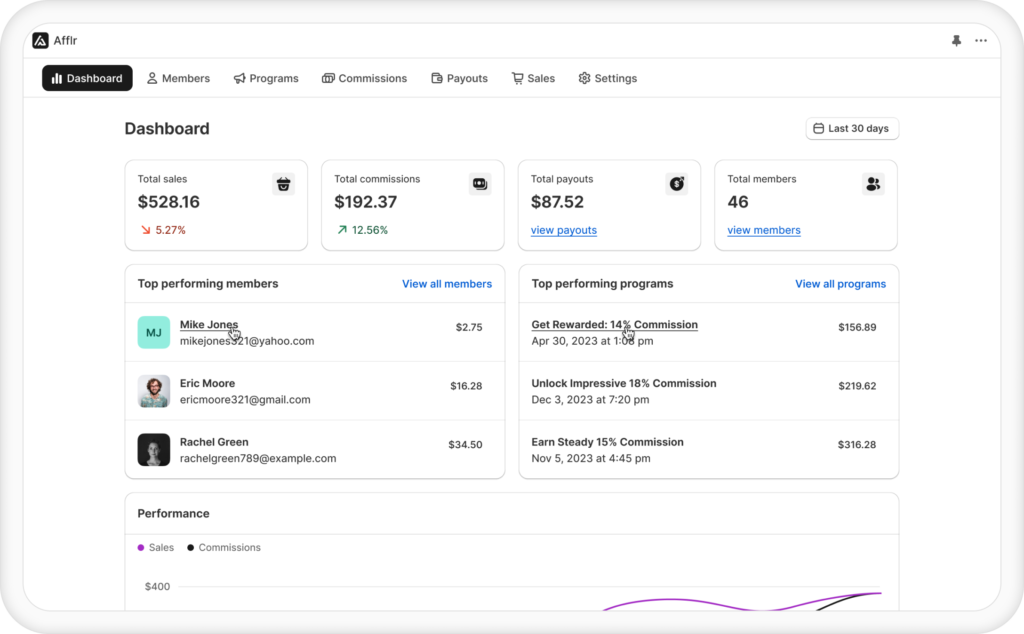Most referral programs struggle to succeed because they try to mimic others. Effective referral marketing strategies aren’t about pushing people to share, but building trust, value, and a seamless customer experience.
When a friend recommends a product, people are likely to check it out. However, that doesn’t warrant a sale. Therefore, to make it work, you need the right plan.
Referral marketing is not just about giving people a discount to share your product. It is building a community with trust and authenticity. Hence, takes time and effort.
In this blog, we are exploring 15 of the best referral marketing strategies brands use today to grow faster. Thus, you can take hints from it and craft your referral strategy marketing plan.
Automate your referral program with Afflr and watch sales multiply through customer recommendations.
What is Referral Marketing?
Referral marketing is an approach where you can use your existing customers to bring in new ones.
This type of word of mouth marketing is often accompanied by rewards for the customers who drive conversion and bring sales.
Some of the best referral marketing strategies can help make it cost less than traditional advertising while delivering better results.
Why Focus on Referral Strategies for Growth?
Before diving into specific strategies, let’s understand how focusing on referral strategies can contribute to your growth:
- Trust Factor: 92% of people trust recommendations from friends (Nielsen).
- Cost-Effective: With referral programs, you can easily turn your customers into brand advocates. Thus, these Customer acquisition strategies cost less.
- Scalable Growth: With the help of social media and strong strategies for referral marketing, your brand can go viral easily. Moreover, to scale quickly, many rely on effective referral techniques.
Proceeding further, let’s explore how to create a strategic referral marketing program that drives conversion.
15 Best Referral Marketing Strategies for Success
The best referral marketing strategies are:
- Design Double-Sided Reward Programs
- Gamify the Referral Experience
- Encourage Social Media Sharing
- Personalize Referral Invitations
- Offer Tiered Incentives
- Collaborate with Brand Advocates
- Create Time-Sensitive Referral Campaigns
- Simplify the Referral Process
- Encourage Referrals with Community
- Cross-Promote with Partners
- Use Seasonal Referral Promotions
- Implement Post-Purchase Referral Triggers
- Leverage Customer Testimonials for Referrals
- Implement Referral Analytics and Optimization
- Develop Niche-Specific Referral Programs
1. Design Double-Sided Reward Programs
Double-sided rewards give incentives to both the referrer and the new customers they bring. Therefore, this referral program marketing strategy creates value for everyone involved.
For example:
- Give the referrer $10 store credit
- Give the new customer 15% off their first purchase
This approach works because it addresses the main question in customers’ minds: “What’s in it for me?”
Referral strategy examples, like the One of Zero Referral program (where both parties get CAD 10), show how powerful this approach can be for driving growth.

Furthermore, to adopt reward-based strategies for referral marketing better, you can learn more about different affiliate commission models.
2. Gamify the Referral Experience
You can turn your referral strategy marketing plan into a fun game. Thus, ensuring active participation.
For example, you can add elements like:
- Progress bars showing a path to bigger rewards
- Leaderboards for top referrers
- Achievement badges for hitting referral milestones
Referral generation techniques that use gamification talk to customers’ competitive nature. Thus, referring becomes engaging as well as compelling.
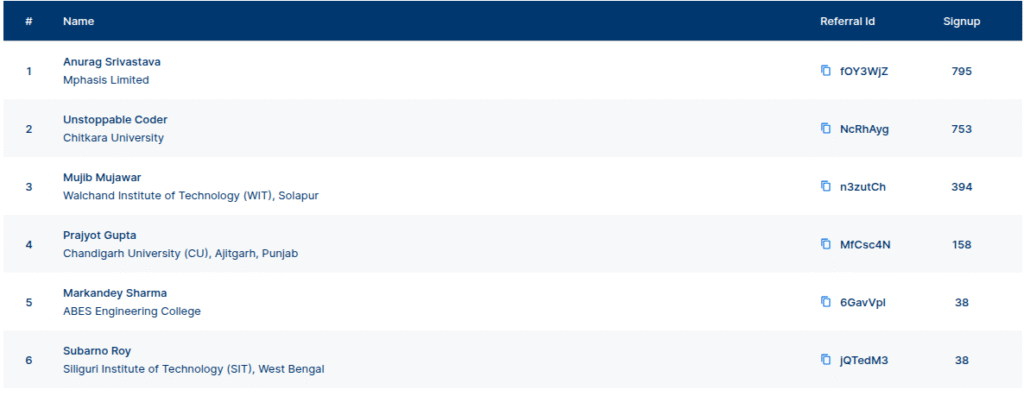
Pro Tip: Apps like Candy Crush are best at providing a gamification experience. Hence, you can borrow their tricks for referral program ideas to keep users hooked.
3. Encourage Social Media Sharing
Make it very easy for customers to share your products on social media with one-click options. Furthermore, incentivize them for social media sharing, like “Get $10 off by sharing on Instagram”.
The best referral marketing ideas are the ones that make customers do more for less. Hence, you can also provide pre-written messages that they can customize and share across platforms.
Digital referral marketing with social proof works best because people naturally like to check what others are saying before making purchase decisions.
Learn here how you can use a popular platform like Facebook for affiliate marketing effectively.
4. Personalize Referral Invitations
People don’t hesitate to ignore generic messages. Therefore, help your customers send personalized referrals to their friends that feel authentic.
Effective customer referral strategies let people add their own story about why they love your products.
Consider these referral strategy ideas:
- Firstly, let customers add personal notes to referral messages
- Then, enable them to recommend specific products they’ve purchased
- Additionally, allow video testimonials as part of the referral

Personalization will make your referral-based growth strategy more authentic and effective. Moreover, various AI tools can help you with such personalization.
5. Offer Tiered Incentives
Naturally, the more customers someone refers, the more they should earn. Hence, it is important to offer performance-based commission.
Moreover, this is one of the best referral marketing strategies for B2B.
For example, this is how tiered referral commission works:
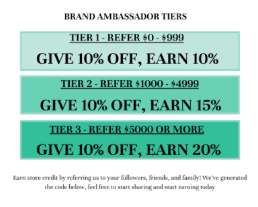
Consequently, this referral campaign example creates a feeling of “just one more” to be able to get better rewards.
Here, you can explore a simple way to set the affiliate commission.
Create a referral system in minutes and turn every purchase into future sales opportunities using Afflr
6. Collaborate with Brand Advocates
Some customers can love your brand more than others. Therefore, identify these people and create a formal brand advocate program.
Apart from referral rewards, you can give such brand advocates,
- Early access to new products
- Exclusive higher rewards for referrals
- Special feedback sessions
Such strategies in referral marketing can create your most valuable referral sources.
7. Create Time-Sensitive Referral Campaigns
More often than not, urgency drives action. Hence, run limited-time viral referral tactics that create FOMO (fear of missing out).
For example:
- “Double rewards weekend” events
- Holiday-themed referral bonuses
- Flash referral opportunities tied to product launches
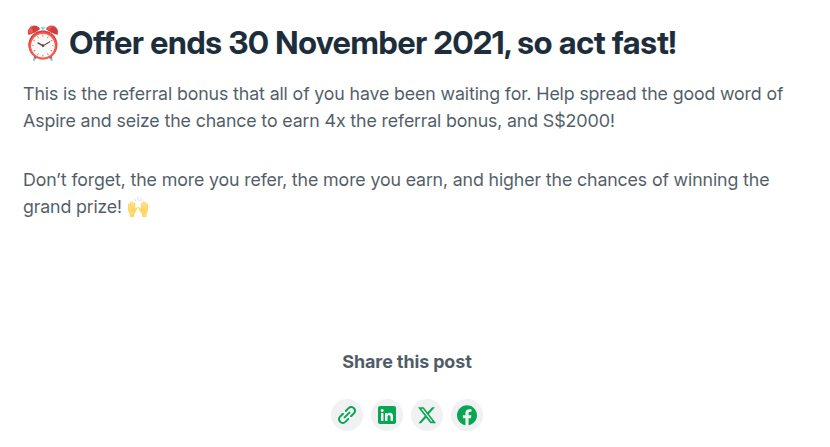
Referral marketing campaign tips: Include deadlines to motivate customers to act now rather than later.
8. Simplify the Referral Process
The easier you make it, the more people will likely sign up and participate. Therefore, streamline your e-commerce referral plans to require minimal effort.
The following is an example of a simple referral signup process.
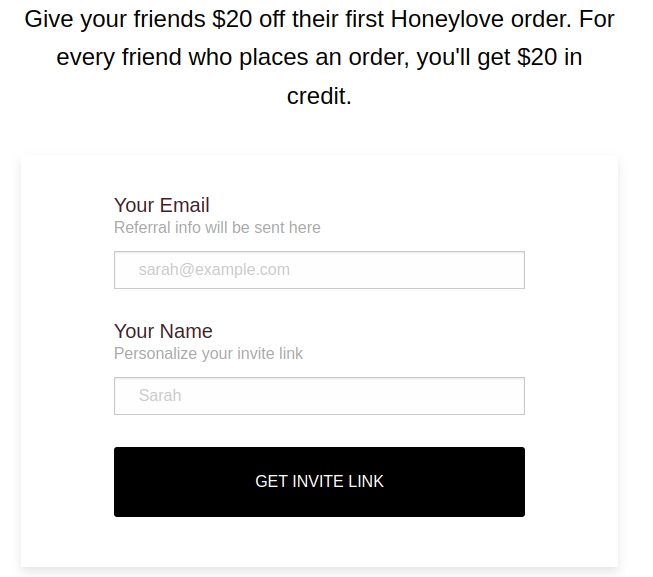
To enable this without compromising on referral link tracking, you can use dedicated referral program apps.
Every extra step reduces the participation rates of your refer-a-friend program. Hence, make it as simple as possible.
9. Encourage Referrals with Community
As part of your referral marketing strategies, build a community around your brand. Thus, through peer-to-peer marketing, referrals can happen naturally.
Furthermore, a simple refer-a-friend strategy can outperform paid ads using trust between friends and family.
You can follow these ideas:
- Creating Facebook groups for customers
- Running challenges where participants tag friends
- Hosting virtual events that encourage bringing guests
Social media referrals flow naturally in communities where people share common interests. Influencer marketing is also one of the easiest ways to bring referrals.
10. Cross-Promote with Partners
You can team up with complementary (not competing) brands to create affiliate marketing strategies that benefit both businesses.
These organic growth strategies can help tap into existing audiences of each other’s brands. As a result, you can find the audience who are likely to appreciate both products.
For example, here is a screenshot of the co-branding collaboration between Starbucks and Spotify
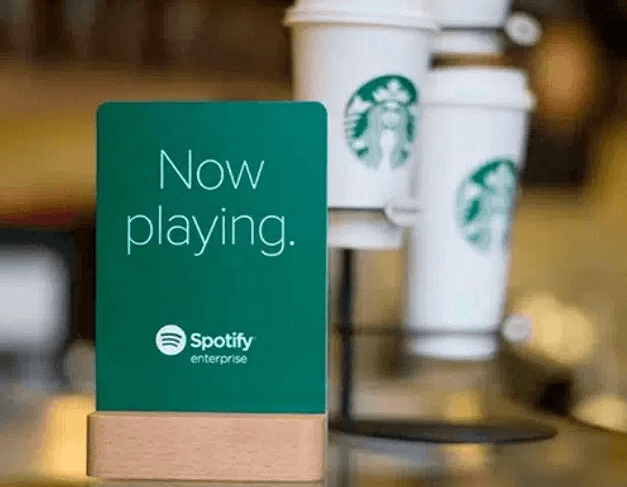
11. Use Seasonal Referral Promotions
You can align your referral campaign examples with seasonal shopping trends. As a result, you can maximize participation right at the time when your customers are already in a buying mood.
You can try some of these seasonal approaches for your referral marketing strategies:
- Black Friday affiliate marketing
- Holiday-themed referral contests
- Summer vacation referral challenges
- New Year’s resolution referral drives
Seasonal referral advertising is rightly timed. Hence, they will be relevant rather than pushy or sales-y.
Here is an example of a Christmas-themed referral program.

12. Implement Post-Purchase Referral Triggers
Approaching your customers the moment after purchase is one of the best referral generation techniques. Since your customers already feel good about their decision, they are most likely to share.
For example, here are some effective post-purchase triggers,
- Thank you page referral prompts
- Order confirmation email, referral options
- Package inserts with referral codes
- Post-delivery text message with sharing links
13. Leverage Customer Testimonials for Referrals
Customer feedback is a very effective tool for recommendation marketing. Therefore, encourage your satisfied customers to share their experiences. As a result, you can drive referrals.

Word-of-mouth referral tactics work best when potential customers can see real results. Furthermore, highlighting genuine customer experiences builds trust faster than any marketing copy.
Additionally, after your customers post positive reviews, guide them toward your customer referral program.
You can implement this by:
- Featuring video testimonials with referral codes
- Creating shareable success stories
- Offering rewards for customers who provide testimonials that convert
14. Implement Referral Analytics and Optimization
For consistent improvement, you must measure the important metrics of your referral campaign. Therefore, track the performance using an efficient affiliate tracking tool.
By analyzing these metrics, you can refine your B2B referral strategies for maximum return on investment.
Key metrics to monitor include:
- Referral conversion rates
- Average value of referred customers
- Lifetime value comparison between referred and non-referred customers
- Most effective referral channels
15. Develop Niche-Specific Referral Programs
You can customize your referral approach to what’s working in your industry. Therefore, research what motivates referrals in your particular affiliate marketing niche.
Some industry-specific considerations:
- Professional services might value knowledge-sharing opportunities
- Luxury brands may prefer experiential rewards over discounts
- Technology companies can offer beta access to new features
- Financial services might focus on value-added services
You have to align your e-commerce referral marketing strategies with your objective. As a result, you can create a program that succeeds with your specific audience.
Streamline customer referrals automatically with Afflr and boost your acquisition rates by up to 30%
Conclusion
Referral marketing strategies can help get the highest ROIs compared to other marketing methods. Hence, by implementing these strategies, you can use the power of your existing customers to drive sustainable growth.
Therefore, you can start with one or two strategies. Then, you can measure results to see what works.
Following that, you can gradually expand your referral-based marketing plan to include more strategies.
Further Reading
- High-Converting Referral Landing Pages
- Top 5 Shopify Affiliate Campaigns to Try
- How to Start Affiliate Marketing for Shopify Stores
- Ultimate Guide to Manage Affiliates and Referrals
Frequenty Asked Questions:
A referral marketing strategy is a plan that encourages existing customers to promote your brand to their friends and family. You can offer incentives for successful referrals. Thus, encourages customer acquisition at lower costs.
A good example of referral marketing is the Salesforce referral program. They created a double-sided reward that drove significant referral-based growth.
A referral is when customers directly connect you with potential buyers. It often involves trackable referral links or codes and incentives. However, a recommendation is informal. It is based on satisfaction rather than rewards.
The best referral marketing software for e-commerce is Afflr. It is Shopify-specific and makes referral program automation easy. Furthermore, other top referral tools are ReferralCandy, Referral Rock, etc.
B2B referral program best practices are: Firstly, creating detailed case studies from successful referrals. Then, offering value-based rewards like service upgrades. Furthermore, maintaining regular communication with referral partners.
